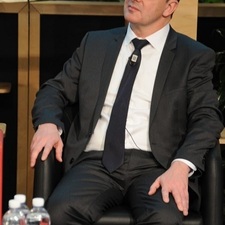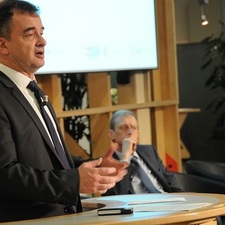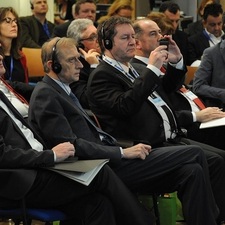European metropolises make demands at the EMA Forum
| Subject: International Relations
The mayors, presidents and political representatives of European metropolitan areas have requested the EU and national and regional governments for official recognition to let them take the helms in the development, planning and execution of urban policies with European funds.
The EMA 2016 Forum, held in Turin on 12 February under the organisation of the Barcelona Metropolitan Area (AMB) and the Italian city, brought together the mayors, presidents and political representatives some 30 European metropolitan areas and concluded with the adoption of the Declaration of Turin, attached to this press release. The document, which will now be submitted to the EU, requests that metropolitan areas have a larger role in defining European policies, particularly in the European Urban Agenda that the Dutch EU presidency is debating. It was also decided that Lyon would be the host of the EMA 2017 Forum.
The AMB representative at the EMA Forum was Alfred Bosch, vice-president of the AMB International and Cooperation Area. He travelled to Turin as a co-host of the conference and also as a participant in the round table ‘EU, national and regional policies for metropolitan areas'.
In the opening words, Turin metropolitan mayor, Piero Fassino, and Alfred Bosch pointed out that ‘the metropolitan dimension is increasingly more important for the development of states, but they do not give the metropolitan areas the recognition they deserve as generators of wealth, jobs and innovation, and the recipients of poverty, climate change, hosts of refugees, and so forth. If the gross domestic product of metropolitan areas is compared to that of their states, the increase of GDP in the former is larger than on a national scale. This means that metropolitan cities are the engines for economic and social growth'.
Alfred Bosch stated that ‘the metropolitan areas do not have enough weight in managing European Union structural funds' and gave the example of Barcelona, ‘which represents 10% of Spain's GDP, but only receives 0.15% of the funds that Spain receives'. He also commented that ‘the AMB will present a study shortly on the European funds under management by 14 large metropolises'.
Bosch emphasised the role that an institution like the AMB plays in providing municipal services on behalf of the city councils, and in redistributing the wealth generated by the city of Barcelona. This is carried out through investment plans that benefit the other 35 city councils in subjects such as social cohesion, employment, public space, housing or the areas of economic activities.
Bosch also explained, at the round table, the targets that the AMB has for the 2015-2019 term of office, which include boosting sustainable mobility, the renewal of public housing policy with actions such as social rents, attracting investments, social and economic development by creating jobs, and, as a whole, improving the quality of life of metropolitan citizens.
Finally, he proposed the organisation of a mission of mayors and metropolitan representatives to Brussels for the next weeks, to present the conclusions of the forum and the main metropolitan demands to the leaders of the EU institutions.
Nowadays, 50% of the world's population lives in urban areas with at least 300.000 inhabitants. European metropolitan cities have become the ideal political and administrative dimension to attract public and private investments, to manage the urban structure of regions, to boost sustainable development, social inclusion, culture, training and education, and the host of refugees.
The Turin forum brought together the mayors, presidents and political representatives of the metropolitan areas of Paris, Lyon, Madrid, Bilbao, Wien, Budapest, Warsaw, Stuttgart, Athens, Thessalonica, Helsinki, Poznan, Milan, Florence, Catania, Bologna, Lisbon and Porto, among others.
The AMB representative at the EMA Forum was Alfred Bosch, vice-president of the AMB International and Cooperation Area. He travelled to Turin as a co-host of the conference and also as a participant in the round table ‘EU, national and regional policies for metropolitan areas'.
In the opening words, Turin metropolitan mayor, Piero Fassino, and Alfred Bosch pointed out that ‘the metropolitan dimension is increasingly more important for the development of states, but they do not give the metropolitan areas the recognition they deserve as generators of wealth, jobs and innovation, and the recipients of poverty, climate change, hosts of refugees, and so forth. If the gross domestic product of metropolitan areas is compared to that of their states, the increase of GDP in the former is larger than on a national scale. This means that metropolitan cities are the engines for economic and social growth'.
Alfred Bosch stated that ‘the metropolitan areas do not have enough weight in managing European Union structural funds' and gave the example of Barcelona, ‘which represents 10% of Spain's GDP, but only receives 0.15% of the funds that Spain receives'. He also commented that ‘the AMB will present a study shortly on the European funds under management by 14 large metropolises'.
Bosch emphasised the role that an institution like the AMB plays in providing municipal services on behalf of the city councils, and in redistributing the wealth generated by the city of Barcelona. This is carried out through investment plans that benefit the other 35 city councils in subjects such as social cohesion, employment, public space, housing or the areas of economic activities.
Bosch also explained, at the round table, the targets that the AMB has for the 2015-2019 term of office, which include boosting sustainable mobility, the renewal of public housing policy with actions such as social rents, attracting investments, social and economic development by creating jobs, and, as a whole, improving the quality of life of metropolitan citizens.
Finally, he proposed the organisation of a mission of mayors and metropolitan representatives to Brussels for the next weeks, to present the conclusions of the forum and the main metropolitan demands to the leaders of the EU institutions.
Nowadays, 50% of the world's population lives in urban areas with at least 300.000 inhabitants. European metropolitan cities have become the ideal political and administrative dimension to attract public and private investments, to manage the urban structure of regions, to boost sustainable development, social inclusion, culture, training and education, and the host of refugees.
The Turin forum brought together the mayors, presidents and political representatives of the metropolitan areas of Paris, Lyon, Madrid, Bilbao, Wien, Budapest, Warsaw, Stuttgart, Athens, Thessalonica, Helsinki, Poznan, Milan, Florence, Catania, Bologna, Lisbon and Porto, among others.
Bosch va destacar el paper que juga una institució com l'AMB en la prestació de serveis municipals per compte dels ajuntaments i també el paper de redistribució de la riquesa que genera la ciutat de Barcelona i que es materialitza a través de plans d'inversions que beneficien els altres 35 ajuntaments en àmbits com la cohesió social, l'ocupació, l'espai públic, l'habitatge o les àrees d'activitat econòmica.















































